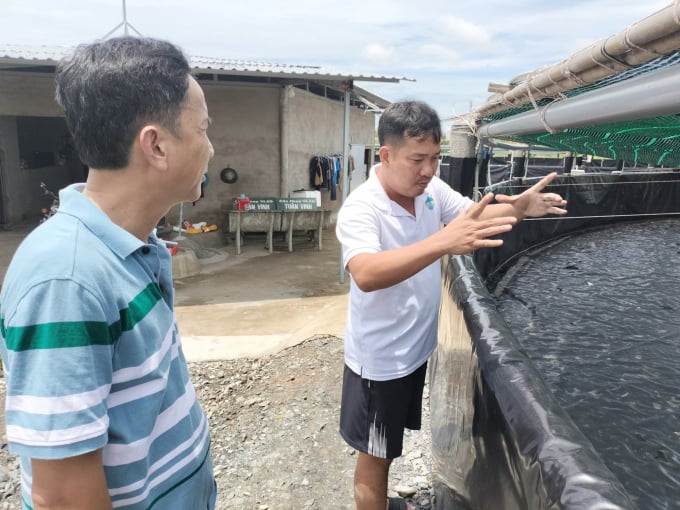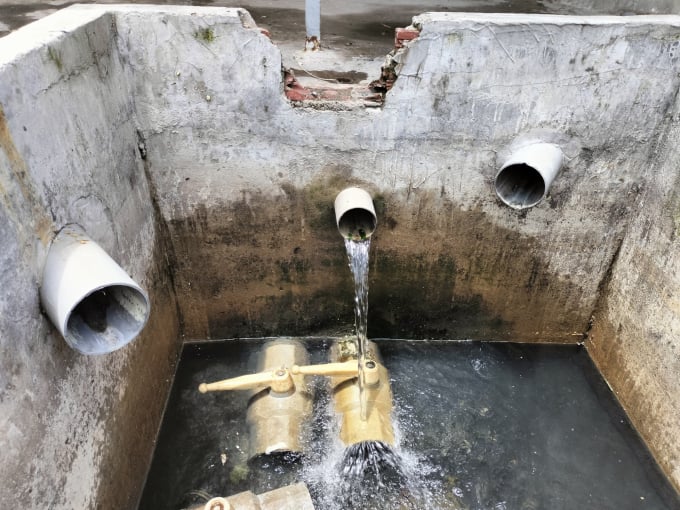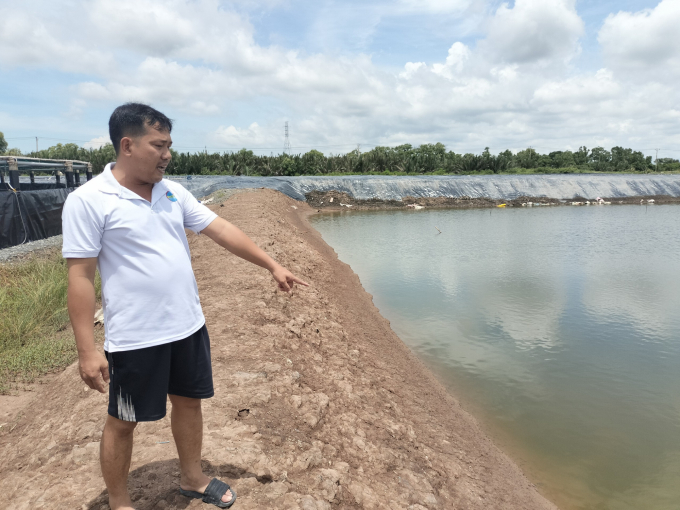May 18, 2025 | 05:15 GMT +7
May 18, 2025 | 05:15 GMT +7
Hotline: 0913.378.918
May 18, 2025 | 05:15 GMT +7
Hotline: 0913.378.918

High density intensive white leg shrimp farming produces a large amount of waste. Photo: Minh Dam.
Currently, industrial shrimp farming models, especially super-intensive white leg shrimp farming, bring high economic efficiency due to good disease management. However, many super-intensive white-leg shrimp farming households have not invested in wastewater treatment technology, which leads inadequacies, especially the discharge of wastewater, pollutes the environment and affects other farming households.
In Long Vinh Commune, Duyen Hai District, Trà Vinh Province - a locality with a growing movement of high-tech shrimp farming, shrimp farms must have ponds (lakes) to settle wastewater before discharging it into the environment, said Lam Van Quang, Chairman of the Commune People's Committee.However, not all local shrimp farms meet the requirement.This causes conflicts with extensive shrimp farmers. The Commune People's Committee asked the shrimp farming households to address and sign a commitment not to discharge wastewater directly into the environment, Quang said.
According to the Department of Natural Resources and Environment of Tra Vinh province, last year, authorities conducts inspections at high-density intensive brackish water shrimp farming and snakehead fish farming facilities in the districts of Duyen Hai, Tra Cu, Cau Ngang, Tieu Can and Duyen Hai town.
Many high-tech shrimp farming households have invested in biogas systems to treat waste. In a 20ha white leg shrimp farming area in Duyen Hai town, Tra Vinh province, farmer Le Nguyen Van Khoa invested in 14 round lakes, each with an area of 1,200 sq.m about two years ago. At each lake, he invested in a biogas tank made of composite materials with a size of 17 sq.m. Waste including shrimp shells, dead shrimp are put into biogas tanks. Through treatment, wastewater from the biogas tank flows out colourless, without any odors.

Wastewater from shrimp ponds, after being treated through a biogas tank, has no odor. Photo: Minh Dam.
Khoa said that the investment was low-cost but very effective. Treated waste water was certified to meet environmental criteria. The wastewater is green in colour of algae, with fish living in it, similar to the colour of river water.
Recently, the People's Committee of Duyen Hai Town, Tra Vinh province issued Decision No. 390/QD-UBND promulgating the Action Plan to implement the Fisheries Development Strategy in the area to 2030, with a vision to 2045. Under the plan, the town wants to build an efficient and sustainable fisheries industry in terms of economy, society and environment, proactively adapting to climate change.

Wastewater in the lake is clear, with many algae living in it, and does not pollute the environment. Photo: Minh Dam.
Specifically, by 2025, the production value of the aquaculture industry will grow at an average rate of 5 per year or more, the average aquaculture production value will reach VND 380 million per hectare of water surface. It is expected that the aquaculture area will reach 11,000 ha or more. The total production of aquatic products reached 35,450 tonnes, of which, the fishing output reached 11,000 tonnes.To achieve those goals, the town outlined solutions to develop synchronous fisheries infrastructure, develop and apply science and technology, develop human resources, improve seafood processing capacity.
In particular, the town would focus on applying new, advanced and environmentally friendly technologies to reduce and handle environmental pollution in seafood production. To develop the fisheries sector, it is also necessary to organise the conservation and exploitation of aquatic resources and develop aquaculture in harmonisation of benefits with the development of other economic sectors such as tourism, energy, transport and urban and industrial development.
According to the Department of Agriculture and Rural Development of Tra Vinh province, in the first 7 months of 2022, the locality has stocked 4.74 billion white leg shrimp on an area of nearly 7,000 ha, of which high-density intensive farming is 1.48 billion shrimp yearly on the area of 733ha.
Translated by Hien Anh

(VAN) Minister of Agriculture and Environment Do Duc Duy held a meeting with Soopakij Chearavanont, Chairman of C.P. Group, on May 15.
/2025/05/16/3800-0-nongnghiep-143756.jpg)
(VAN) Suntory PepsiCo Vietnam coordinated with the Ministry of Education and Training to implement an education program on water conservation, reaching nearly 1 million primary school students nationwide.

(VAN) Vietnam’s TH Group officially put its high-tech fresh milk processing plant into operation in the Russian Federation, marking a historic moment as the first TH true MILK cartons were produced in Russia.

(VAN) Use of high-quality broodstock and biotechnology is regarded as the most effective approach to ensuring sustainable and economically viable shrimp aquaculture ahead of climate change and the emergence of increasingly intricate disease patterns.

(VAN) Carbon farming is a form of agricultural practices that helps absorb more greenhouse gases than it emits, through smart management of soil, crops, and livestock.

(VAN) This is a key content of the Memorandum of Understanding recently signed between the Vietnam Fisheries Society and Kunihiro Inc of Japan.

(VAN) To achieve the goal, local authorities and businesses in Kon Tum province have fully prepared the necessary conditions for the new Ngoc Linh ginseng planting season.